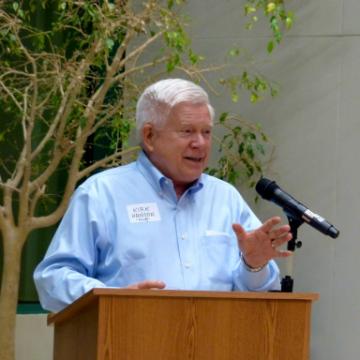
The Search for Worthwhile Work
I recently spoke to Bentley University students about ethical dilemmas they were likely to encounter when they started working. The first one was “what is worthwhile work?” I share my remarks here as I think the topic of vocation is at the heart of the Jesuit education we provide at SCU.
When we graduate, or whenever we think about changing jobs, we are matching three things in deciding on our “vocation” — the job market (are there jobs and opportunities?), our skills (do I have the right skills to succeed in a particular job?) and our passions or beliefs (what do I want to do?).
The search for meaningful work starts with our own awareness of our personal values.
The search for meaningful work starts with our own awareness of our personal values. These values are the stuff of ethics and lead us to understand what “doing meaningful work” actually means. Developing, or perhaps uncovering our values, is a continual process, driven by reflection.
As one of my MBA students put it: do I want to spend my life selling flowered toilet paper over plain toilet paper? Do I think my company and industry contributes something to the human condition? Am I satisfied I am not detracting from the human condition because of safety flaws, environmental damage or human rights violations?
Answering these questions has a cost. For example, imagine that I have a Wall Street offer, but I am passionate about managing people and improving their lives. I will only get that in a manufacturing job. Or perhaps I am in medical school and attracted by the earnings of various specialties, but want to practice family medicine. Or imagine that I am getting my law degree and drawn to serve the poor or advance environmental causes, but I have big debts and that corporate law offer is pretty attractive. Should I take the lower salary? What do I do?
Sometimes worthwhile work can be found in working in a corporate culture that respects its workers and their personal lives.
Sometimes worthwhile work can be found in working in a corporate culture that respects its workers and their personal lives. You may work where management is supportive and workers thrive and advance, but you can also find yourself working in a toxic environment where human dignity is torn down and responding to one’s family commitments is regarded as weakness.
I believe any hope of influencing corporate behavior resides with hundreds of thousands of individuals, like you and me, making individual ethical choices. If we manage to do this, companies and their managers will be held to a higher standard; companies will reflect more on what really are worthwhile products and services; companies will be quicker to clean up “toxic environments” populated by bullies. And companies will come to understand that one of the core motivations of all employees is the desire to contribute to the common good, to do something of lasting significance.

